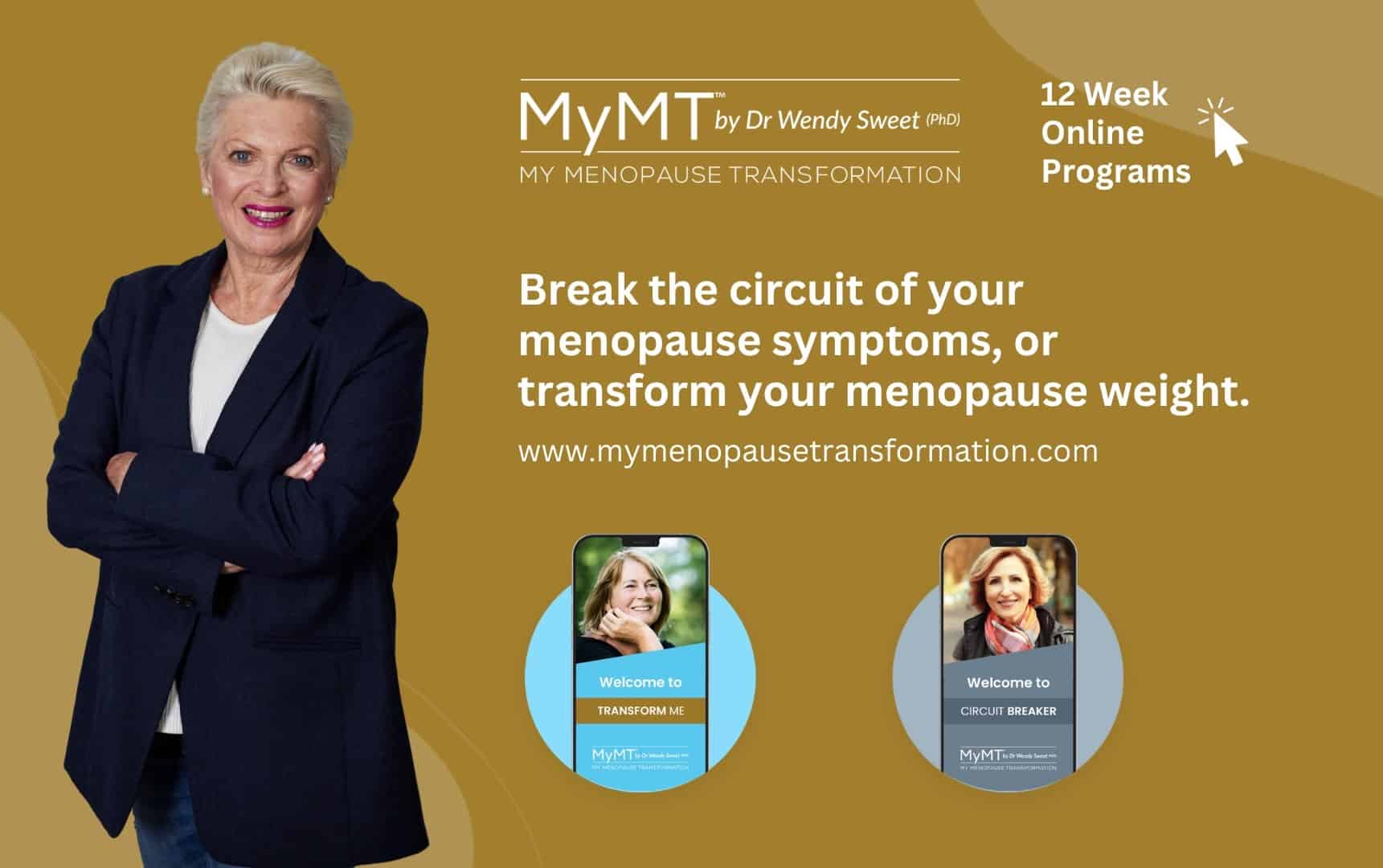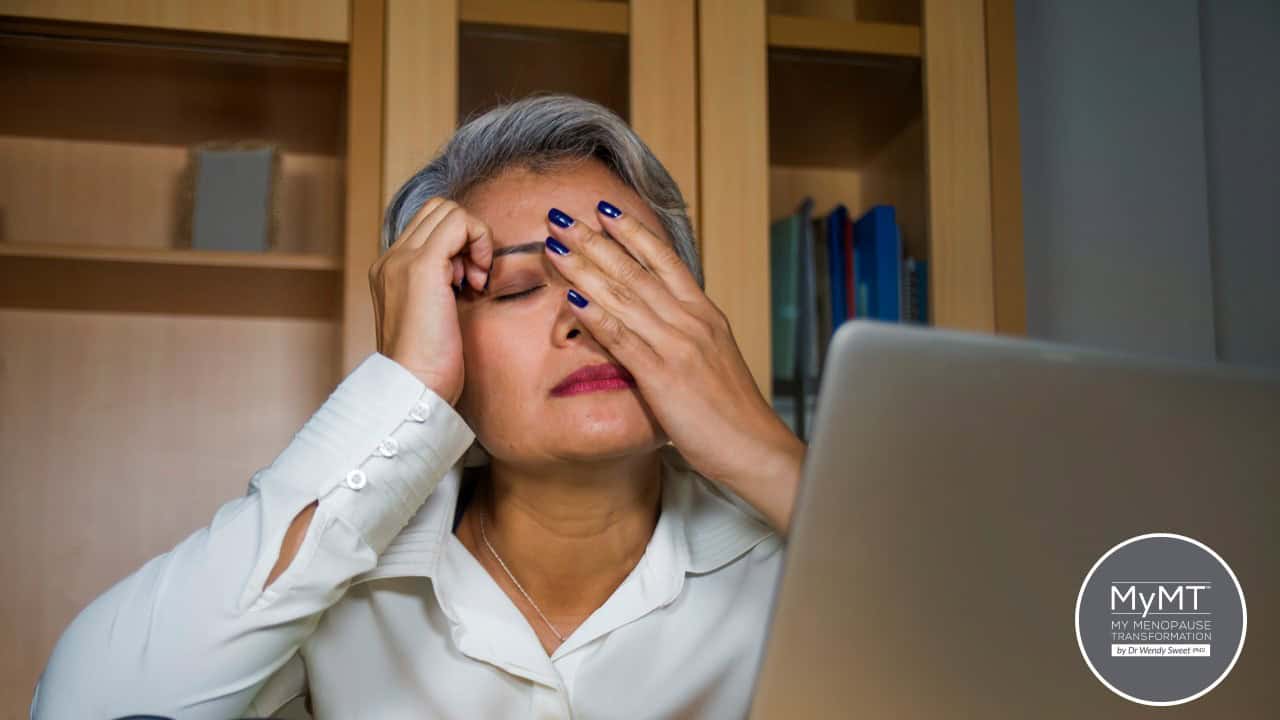Shortages of some hormone replacement therapy (HRT) products have hit the headlines lately and the Radio New Zealand reporting of a national shortage of Hormone Replacement Therapy patches in New Zealand didn’t surprise me (18th May, 2024).
Afterall, the same situation happened in the UK in 2019 – “HRT: UK faces shortage for menopausal women” shouted the headline on the 19th of August, from the BBC news page.
And according to both of these articles, the anxiety associated with these shortages may be sending thousands of women into the very symptoms that menopause-HRT is supposed to alleviate – anxiety, mood swings and hot flushes.
The menopause transition can have a considerable impact on many women, especially those living in western societies. For a significant proportion troublesome symptoms may continue long-term.
Hormone replacement therapy (HRT) is the most commonly used treatment for managing menopausal symptoms. Numerous studies show its efficacy [Hamoda et al, 2020; Talaulikar, 2022], although these results may vary for women over the age of 60, as well as between different ethnicities [Kingsberg, 2023], so what happens when HRT prescriptions have exploded, leading to a global shortage of ‘the patch’?
Are there alternative strategies for symptom relief that are equally evidenced?
That’s what I want to share with you in this blog.
And no, I’m not recommending that you get off Menopause HRT – this is a medical decision that is between you and your Doctor. But evidence is accumulating that evidenced lifestyle changes will positively benefit you with your symptom reduction as well.
Afterall, as I’ve stated for a decade now, ‘menopause is the bookend to puberty‘ and we didn’t need lots of medications or endless supplements then either.
Thinking about this alongside my doctoral studies on women’s health and ageing, led me to investigate lifestyle science strategies that all women may benefit from during menopause to reduce their hot flushes/flashes, anxiety and insomnia. If this is you and you’re feeling overwhelmed and anxious as you transition menopause and the menopause HRT shortage is keeping your anxiety levels elevated, then please read on.
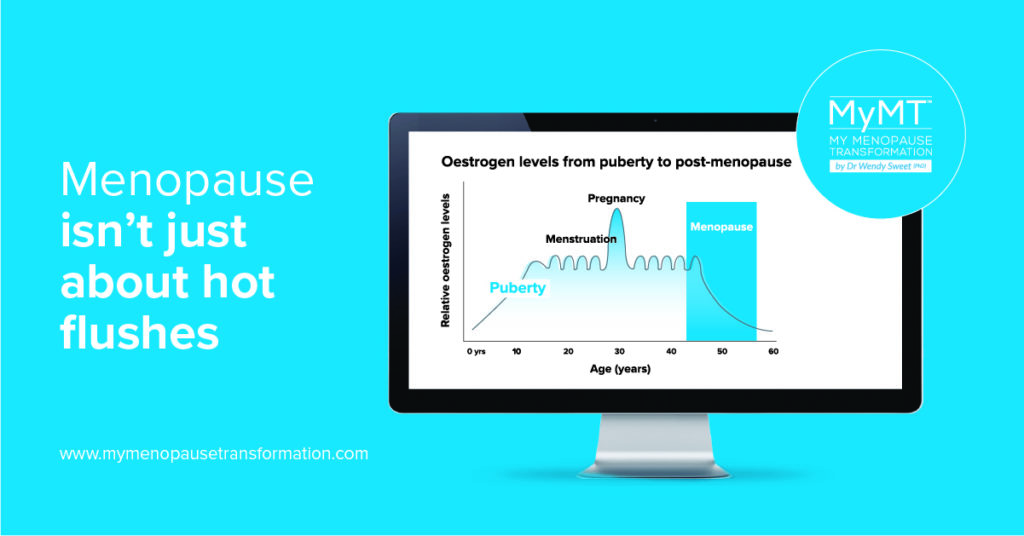
Menopause is the biological gateway to women’s ageing
Feelings of anxiety, brain-fog and heat intolerance as women move through menopause can’t just be blamed on declining oestrogen and progesterone.
Numerous changes occur around the body when reproductive hormones decline.
For example, the nervous system is ageing. As oestrogen levels decline, this impacts the irritability of the nerve signal travelling along the nerve, especially nerves in the brain, because the nerve axon and myelin sheath outer membrane, become more vulnerable with age.
As such, specific nutrients are known to target enhanced function and conduction of nerves during menopause. This includes the B-vitamins and folic acid [El Soury et al., 2021], Magnesium [Vink & Nechifor, 2011] as well as Vitamin D [Mei et al., 2023] and compounds found in Extra Virgin Olive Oil [Lauretti et al, 2020] and Green Tea [Unno & Nakamura, 2021].
Blood vessels are changing with age too. Oestrogen helps to maintain their dilation as they lose elasticity, but so too does numerous nutrients in foods that are known to reduce vascular stiffness – the very thing that menopause HRT is known to help alleviate. [De Bruyne et al., 2019; Preedy & Watson, 2020; Sarapis et al., 2020; Vamvakis et al., 2020]
When these structural changes throughout the body clash with a woman’s active, stressful lifestyle during menopause, the result is increased hot flushes, insomnia, anxiety, mood swings, weight changes (gain and/or loss of weight), poor gut health and for many women, sore joints and aching muscles too.
Until I did my women’s healthy ageing studies, I had no idea about all these things either.
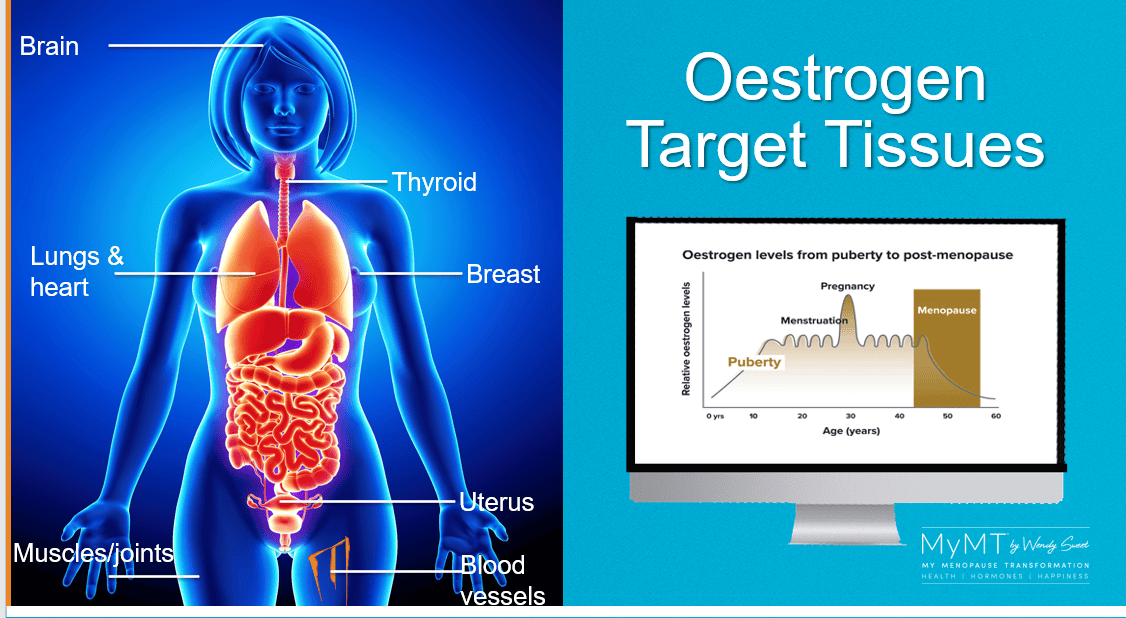
When Women Are Busy and Stressed, this Keeps Their Nerves and Brain in ‘Fight or Flight’ Mode
Menopause HRT is evidenced to help reduce feelings of anxiety and overwhelm as well as hot flushes/flashes. [Zhang et al, 2021; NICE Guidelines, 2023], but what effect is their busy, stressful lifestyle having on these symptoms too?
This is where some understanding of the vagus nerve and other nerves, and how they react in ‘stress-response mode’, and the effect that this has on progesterone levels comes into play.
We all know that in moderation, the body thrives on some stress. However, for midlife women faced with declining hormones, insomnia and busy, stressful lives, the ‘stress-load’ or allostatic load accumulates. If sleep is impacted, then inflammatory changes accumulate too.
The increase in inflammatory changes, as well as feeling stressed and being constantly busy increases nervous system activity, blood pressure, heart rate, temperature and metabolism.
The roll-on effect of an over-stressed vagus nerve, thyroid and adrenal system, when we aren’t sleeping well, is increased inflammation in our body, especially in the gut and colon. [Hirotsu, 2015] and as a consequence, hot flushes may increase in severity and frequency too.
It’s why medical ailments such as Ulcerative Colitis, Irritable Bowel Syndrome (IBS) or other digestive problems such as ulcers, are more frequently observed in higher-stress patients and are known to be four times higher in midlife women, compared to men.
In fact there is a neurological term for these types of patients known as having a ‘sympathetic dominant metabolism’. This is referring to the fact that the sympathetic ‘fight-or-flight’ nerve pathway is dominating the metabolic environment.
If you are feeling stressed, overwhelmed and you aren’t sleeping or have an irritable bowel, then you need to balance up your day with a little bit of help from the opposite nervous system pathway – your para-sympathetic pathway.
This is your calming nervous system. And during menopause, we need to focus on ‘calm, not chaos’. The difference in symptoms when we do this, can be remarkable.
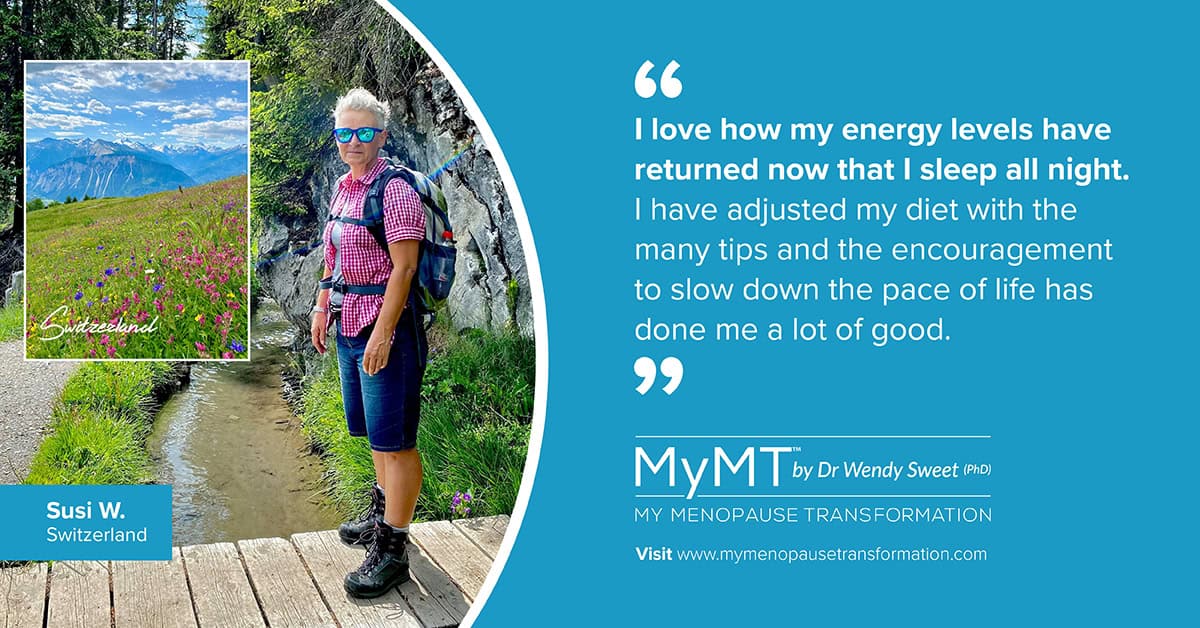
One of my ‘Anxiety-Buster’ tips for women who join me on the My Menopause Transformation programmes, is to focus on lower-intensity aerobic exercise that allows the brain and nervous system to slow down. When we do rhythmic activity, such as walking, hiking, swimming, cycling, dancing or rowing, then we achieve ‘flow’.
This allows us to move in ways that are more natural for our nervous system and muscles and when we find pleasure in our activity, then our anxiety decreases too.
Anxiety and hot flushes are often reported as ‘normal’ symptoms of menopause and yes, many women are helped by going on hormonal replacement therapies at this life-stage.
However, when women take a moment to also reflect on many of the causes of overwhelm and anxiety as well as take action on slowing down, breathing deeply, turning around sleep and changing their nutrition to match their changing hormonal status during menopause, it’s surprising how much better they may feel.
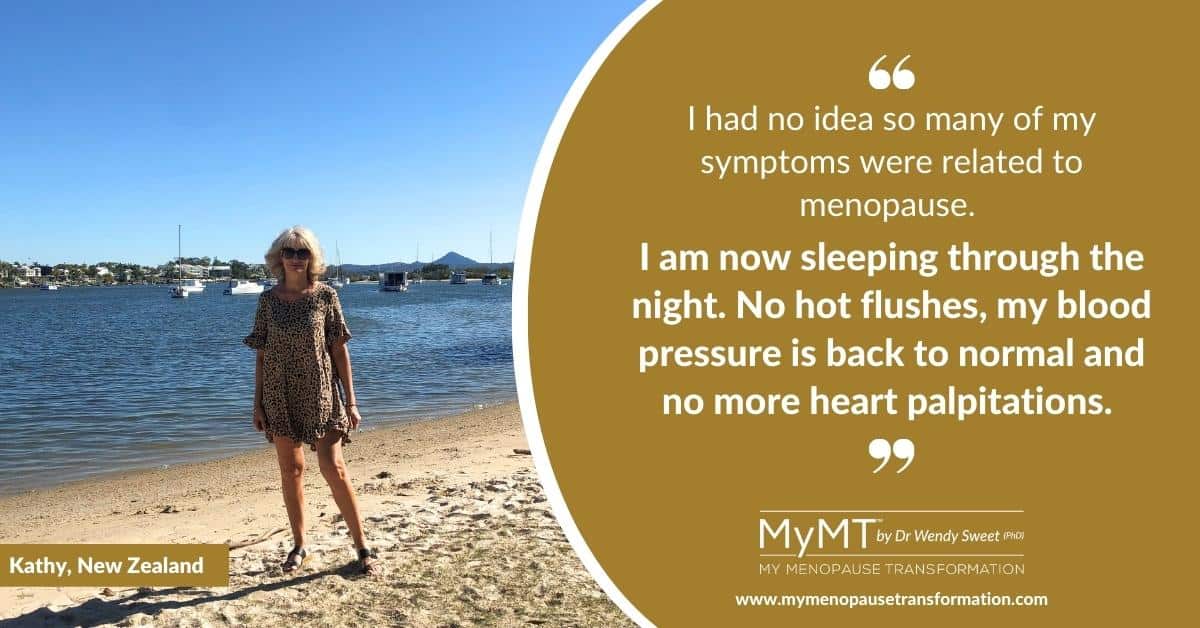
It is well known in women’s health research that mid-life women experience numerous challenges as they juggle their various commitments. [Thomas et al, 2019]. As I’ve learnt from the 16,000+ women who have undertaken my lifestyle-change programs, many keep going until they feel exhausted.
But when reproductive hormones begin to decline in peri-menopause and women begin to experience increased anxiety, hot flushes, palpitations and mood changes, then this is a sign that the body is going into ‘survival mode’. It is also a sign that some blood markers may be low, such as Vitamin D, iron, B12 and ferritin (stored iron). I have written about these HERE.
This is where menopause HRT can make a difference, as can some evidenced anti-inflammatory supplements, such as Black Cohosh and Evening Primrose Oil and/or phyto-oestrogen supplementation, however, research is variable on the efficacy of these supplements during menopause. [Pierson et al, 2009].
Women mustn’t forget that going through ‘the change’ means focusing on ‘lifestyle change’ too. And how to achieve this is outlined in the My Menopause Transformation programs.
Dr Wendy Sweet, [PhD], Member Australasian Lifestyle Medicine Society/ REPs Exercise Specialist
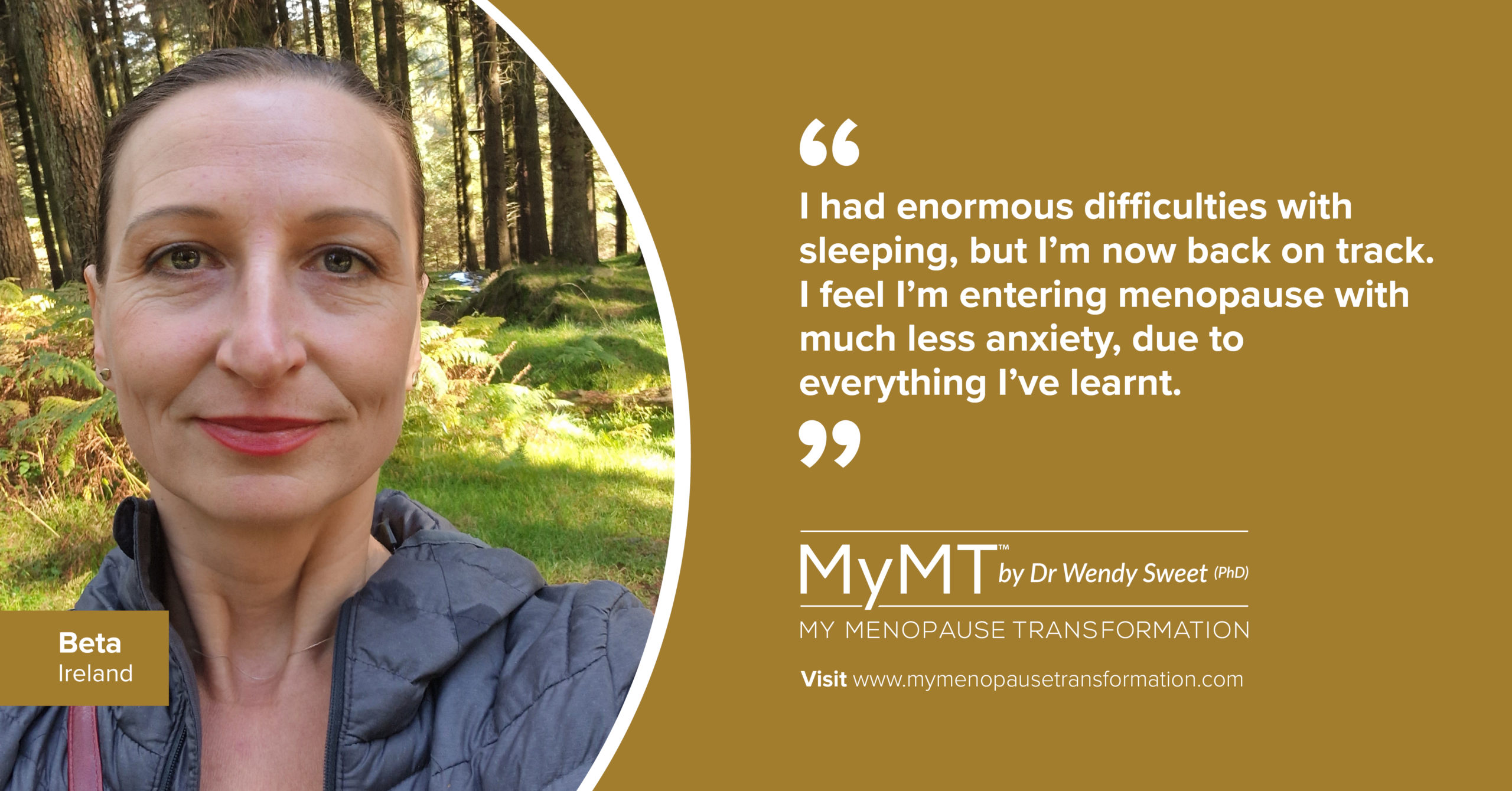
References
De Bruyne T, Steenput B, Roth L, De Meyer GRY, Santos CND, Valentová K, Dambrova M, Hermans N. Dietary Polyphenols Targeting Arterial Stiffness: Interplay of Contributing Mechanisms and Gut Microbiome-Related Metabolism. Nutrients. 2019 Mar 8;11(3):578.
El Soury M, Fornasari BE, Carta G, Zen F, Haastert-Talini K, Ronchi G. The Role of Dietary Nutrients in Peripheral Nerve Regeneration. Int J Mol Sci. 2021 Jul 10;22(14):7417.
Gonzalez, N. (2017). Nutrition and the Autonomic Nervous System. New York: New Springs Press.
Hamoda H, Panay N, Pedder H, Arya R, Savvas M. The British Menopause Society & Women’s Health Concern 2020 recommendations on hormone replacement therapy in menopausal women. Post Reprod Health. 2020 Dec;26(4):181-209. doi: 10.1177/2053369120957514.
Hantsoo L, Epperson CN. Anxiety Disorders Among Women: A Female Lifespan Approach. Focus (Am Psychiatr Publ). 2017 Spring;15(2):162-172. doi: 10.1176/appi.focus.20160042. Epub 2017 Apr 10. PMID: 28966563
Hirotsu C, Tufik S, Andersen ML. Interactions between sleep, stress, and metabolism: From physiological to pathological conditions. Sleep Sci. 2015 Nov;8(3):143-52. doi: 10.1016/j.slsci.2015.09.002.
Huppert, F., Baylis, N. & Barry, K. (2007). The science of well-being. Oxford, UK: Oxford University Press.
Kingsberg SA, Schulze-Rath R, Mulligan C, Moeller C, Caetano C, Bitzer J. Global view of vasomotor symptoms and sleep disturbance in menopause: a systematic review. Climacteric. 2023 Dec;26(6):537-549. doi: 10.1080/13697137.2023.2256658.
Lauretti E, Nenov M, Dincer O, Iuliano L, Praticò D. Extra virgin olive oil improves synaptic activity, short-term plasticity, memory, and neuropathology in a tauopathy model. Aging Cell. 2020 Jan;19(1):e13076. doi: 10.1111/acel.13076. Epub 2019 Nov 24.
Lima-Alves, D., Rocha, S. et al. (2019). The positive impact of physical activity on the reduction of anxiety scores: a pilot study. Revue of Assoc. Med., 65(3), 434-440
Mei Z, Hu H, Zou Y, Li D. The role of vitamin D in menopausal women’s health. Front Physiol. 2023 Jun 12;14:1211896. doi: 10.3389/fphys.2023.1211896.
Geller SE, Shulman LP, van Breemen RB, Banuvar S, Zhou Y, Epstein G, Hedayat S, Nikolic D, Krause EC, Piersen CE, Bolton JL, Pauli GF, Farnsworth NR. Safety and efficacy of black cohosh and red clover for the management of vasomotor symptoms: a randomized controlled trial. Menopause. 2009 Nov-Dec;16(6):1156-66. doi: 10.1097/gme.0b013e3181ace49b.
Preedy, V. & Watson, R. (2020). The Mediterranean Diet: An evidenced-based approach. Elselvier Academic Press: London, United Kingdom.
Sarapis K, Thomas CJ, Hoskin J, George ES, Marx W, Mayr HL, Kennedy G, Pipingas A, Willcox JC, Prendergast LA, Itsiopoulos C, Moschonis G. The Effect of High Polyphenol Extra Virgin Olive Oil on Blood Pressure and Arterial Stiffness in Healthy Australian Adults: A Randomized, Controlled, Cross-Over Study. Nutrients. 2020 Jul 29;12(8):2272. doi: 10.3390/nu12082272.
Thomas AJ, Mitchell ES, Woods NF. Undesirable stressful life events, impact, and correlates during midlife: observations from the Seattle midlife women’s health study. Womens Midlife Health. 2019 Jan 3;5:1. doi: 10.1186/s40695-018-0045-y.
Unno K, Nakamura Y. Green Tea Suppresses Brain Aging. Molecules. 2021 Aug 12;26(16):4897. doi: 10.3390/molecules26164897.
Vamvakis A, Gkaliagkousi E, Lazaridis A, Grammatikopoulou MG, Triantafyllou A, Nikolaidou B, Koletsos N, Anyfanti P, Tzimos C, Zebekakis P, Douma S. Impact of Intensive Lifestyle Treatment (Diet Plus Exercise) on Endothelial and Vascular Function, Arterial Stiffness and Blood Pressure in Stage 1 Hypertension: Results of the HINTreat Randomized Controlled Trial. Nutrients. 2020 May 7;12(5):1326. doi: 10.3390/nu12051326.
Vikram Sinai Talaulikar. “Hormone Replacement Therapy for Menopausal Symptoms – A Summary of Current Scientific
Evidence”. EC Gynaecology 11.9 (2022): 39-45.
Vink R, Nechifor M, editors. Magnesium in the Central Nervous System [Internet]. Adelaide (AU): University of Adelaide Press; 2011. PMID: 29919999.
Zhang GQ, Chen JL, Luo Y, Mathur MB, Anagnostis P, Nurmatov U, Talibov M, Zhang J, Hawrylowicz CM, Lumsden MA, Critchley H, Sheikh A, Lundbäck B, Lässer C, Kankaanranta H, Lee SH, Nwaru BI. Menopausal hormone therapy and women’s health: An umbrella review. PLoS Med. 2021 Aug 2;18(8):e1003731. doi: 10.1371/journal.pmed.1003731.
